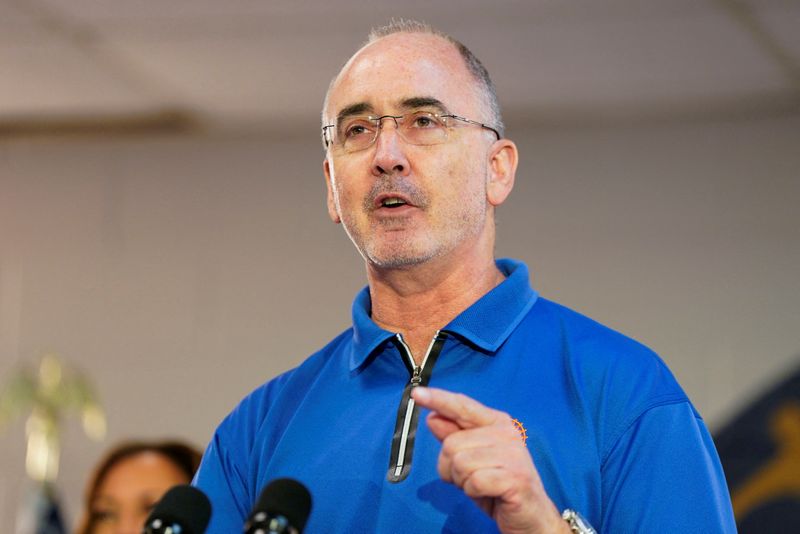By Kalea Hall and Nora Eckert
DETROIT (Reuters) -The United Auto Workers’ leadership is mired in turmoil over allegations of an investment blunder that officials say cost the union about $80 million in potential gains from its financial portfolio, according to seven UAW officials and employees and union documents reviewed by Reuters.
The investment funds were liquidated to pay striking workers in 2023 but weren’t reinvested in accordance with the union’s investment policy for more than a year, according to the documents and the UAW officials and staffers who spoke on condition of anonymity.
The details of the investment dispute at the union, including the estimate of foregone gains, have not previously been reported. The loss is an estimate of what the union would have earned had the money been invested in the stock market and other assets in accordance with the union’s policy during that time.
The UAW represents nearly 400,000 members, including 150,000 workers at the Detroit Three automakers: General Motors, Ford, and Jeep-maker Stellantis.
UAW investment policy calls for keeping about 30% of its money in stocks, 53% fixed income and 17% alternative investments, according to three union sources and the documents.
The board voted to liquidate about $340 million in stock investments in August 2023 to pay strike costs, according to a union document reviewed by Reuters. The wording of the vote stipulated that the money be reinvested according to union policy after the strike ended and the labor contracts were ratified, though it didn’t specify how quickly.
But almost none of its portfolio was invested in stocks during the year after the strike began in September 2023, according to the records reviewed by Reuters. The news agency was unable to establish why the stock investment wasn’t made.
The issue of why the union did not reinvest the funds for more than a year is now being investigated by the federal monitor which was appointed as part of a 2020 settlement between the UAW and the U.S. Department of Justice to resolve a union corruption scandal, according to a statement from a majority of UAW board members.
UAW President Shawn Fain and Secretary-Treasurer Margaret Mock did not respond to requests for comment on the failure to invest union dues.
Mock’s attorney, Michael Nicholson, declined to comment on why the union’s money wasn’t promptly reinvested in stocks or Mock’s role, but told Reuters that responsibility for UAW’s investments is shared by the union president, secretary-treasurer and its three vice presidents, citing a 1996 UAW resolution.
“We welcome the monitor’s review regarding investments, because we believe that any accusations against Margaret Mock are unfounded,” he added.
The financial setback is the latest challenge for the UAW. The union had been resurgent after the late-2023 strike, the union’s first against all three major Detroit automakers at the same time, which culminated in record contract gains from GM, Ford and Stellantis.
The union also successfully organized a Volkswagen factory in Tennessee in April 2024 after decades of failed union drives in the southern United States.
Since then, though, the UAW’s organizing momentum has stalled, including a failed unionization vote at an Alabama Mercedes-Benz plant in May 2024.
LOST GAINS
The tensions over union investments emerged late last year as some board members started questioning why the union’s return on its portfolio seemed paltry relative to broader stock-market gains, according to union documents and five people familiar with the matter.
In August 2023, the UAW board voted to sell all of the equities in its strike fund, leaving the remainder invested in a mix of cash, bonds and alternative investments, according to the documents and people familiar with the matter.
The following month, UAW workers walked out of the carmakers’ factories for about six weeks and were paid $500 a week from the union’s strike fund. Any money remaining after the contracts with the car companies were ratified in November was to be reinvested per the union’s investment policy.
But rather than reinvesting in stocks, the funds were placed in a mix of cash, fixed-income and alternative assets through September 2024 when the portfolio contained 5% in equities, the documents show.
In late 2024, Fain asked in one meeting why the union was getting lower returns on its portfolio than he could in a cash bank account, according to four people present at the gathering.
In February 2025, union staff conducted an analysis that showed the union might have earned $80 million more if its portfolio had been invested according to union policy, according to a document viewed by Reuters.
The document did not detail their methodology, but union sources said it was based on a comparison of the union portfolio’s actual results to what the returns would have been under its policy, which includes a 30% allocation in a fund that tracks the Russell 3000 index, the UAW’s preferred equity investment, according to people familiar with the matter.
That fund grew 33% from late November 2023, after the contracts were ratified, through January 2025, shortly after UAW officials raised their concerns.
The union worked with the financial firm Segal Marco Advisors to manage its strike trust of about $1 billion, the people and documents said. Reuters couldn’t establish how the firm advised the union to manage the liquidated funds. The firm didn’t respond to requests for comment.
TROUBLED HISTORY
Apart from the dispute over the UAW’s investment decisions, broader tensions between Fain and Mock burst into public view Tuesday with the release of a report by the union’s federal monitor that found Fain improperly stripped Mock of some of her duties in February 2024 because she wouldn’t authorize expenditures related to strike preparation and organizing drives.
The UAW declined to comment on either the report or the investment concerns, citing a federal monitor’s rule prohibiting UAW public comments on active probes. The report did not address the failure to reinvest the funds after the strike.
After its release, 11 of the UAW’s 14 board members – including Fain – issued a statement saying Mock had failed to produce a budget or list of union members. The statement added: “She is under investigation by the monitor for a significant compliance failure regarding our union’s investments.”
The federal monitor’s office has told UAW board members that it now is investigating the post-strike failure to reinvest union funds, according to four of the people and union documents.
The federal monitor declined to comment on whether it was investigating the union’s investment management and Reuters could not independently confirm it.
(Reporting by Kalea Hall and Nora Eckert; editing by Mike Colias, Brian Thevenot and Michael Learmonth)







